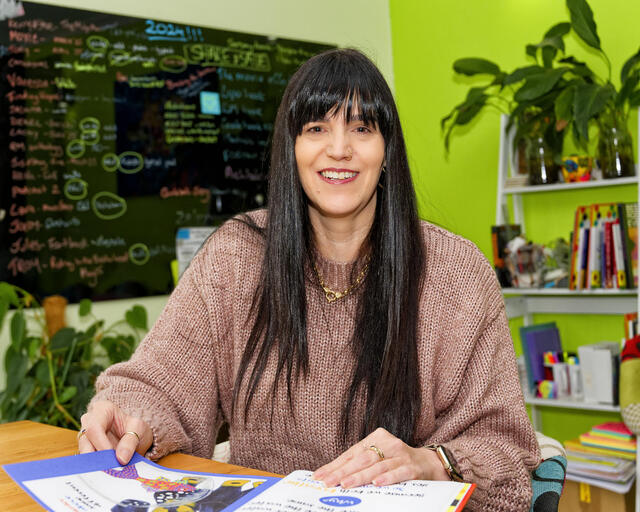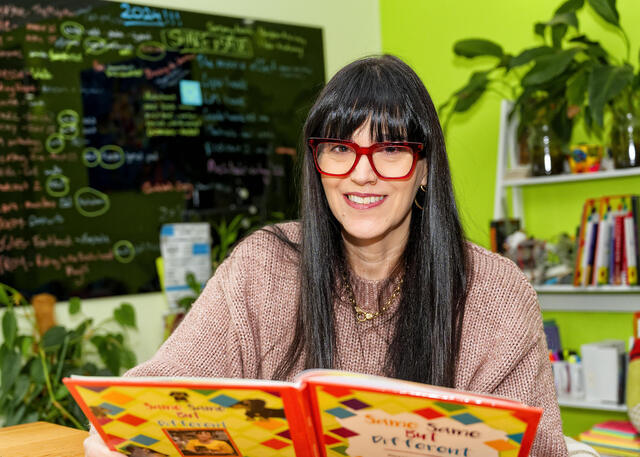Marshall’s Justine Martin has been through a lot over 54 years. She spoke with Jena Carr about the importance of heart health following the release of new research on May 27, revealing that 38 per cent of Victorians aged 50 and above live with atrial fibrillation.
Justine Martin, 54, continues to lift herself through all the challenges life has thrown at her despite experiencing many health issues and domestic violence.
The Marshall woman’s journey started in 2011 when she was diagnosed with multiple sclerosis (MS), a chronic autoimmune disease.
Justine further discovered she had atrial fibrillation (AF), a common heart rhythm disorder, 15 months later in September 2012.
“I got rushed into hospital with this stabbing pain in my head. It was like someone was putting a dagger in my head and then leaving it there for a minute or two and then pulling it out… My resting heart rate was at 155 beats per minute (BPM),” she said.
“(A normal resting heart rate is between 60 and 100 BPM), so I was put on beta-blocker medication to help slow down my heart… but my heart level dropped too low when it wasn’t in AF.
“I went down to about 44 BPM and I was nonfunctioning and couldn’t stand up. I did different types of beta-blockers for months and months, but none of it worked.”
After undergoing initial treatment and surgery to control her AF symptoms in October 2013, Justine’s heart rate spiked 11 weeks later to 217 BPM, and she had to undergo another round of surgery.
However, she was left with premature atrial contractions, which involve early heartbeats originating from the heart’s upper chambers. A third surgery was then performed in an attempt fix this, but led to pericarditis (inflammation of the heart lining).
“Then in 2016, I started going purple with a condition called livedo reticularis (a skin condition characterised by a reddish-blue and net-like pattern on the skin),” Justine said.
“I then had a biopsy on my leg, and less than 24 hours later, I got a message from the nurse who told me I had melanoma.
“Then I lost the ability to breathe properly, and I couldn’t bend my fingers and my toes by December that year. That’s when I got diagnosed with another condition called mixed cryoglobulinemia.
“My body was killing itself. Cryoglobulins are a protein in your blood, and I had an excessive amount of them. So, my bone marrow and white blood cells were making too many cryoglobulins.
“Then I got a phone call telling me in January (2017) that I had chronic lymphocytic leukemia (CLL – a blood cancer where the bone marrow produces too many abnormal blood cells) and small lymphocytic lymphoma (similar disease to CLL but in a different primary cancer location). I was stage 4.
“I then got diagnosed with lipedema, which is inflammation of the fat, in 2018, which affects 11 per cent of all women and in 2022, I further got diagnosed with mast cell activation syndrome (a condition causing immediate allergic reactions).”
And if a list of health issues weren’t enough of a challenge, Justine is also a survivor of domestic violence.
“When I lost the ability to work in 2011 (due to MS), I solely became reliant on my fiancé at the time, and he controlled everything,” she said.
“I had to ask to spend money, and if I spent too much on grocery shopping, I copped it. Yet he was gambling our money away, and I’d go to pay for things at the checkout, and there’d be no money.
“Domestic violence doesn’t just happen by someone punching you or breaking bones. There’s also coercive control, and I’ve been in relationships with coercive control nearly my whole life.
“My mum was a narcissist, so I’d associated trauma and love in the same sentence. So, for me to feel loved, I had to have the trauma or bad behaviour that was around it.
“When my arm was broken, that was the epiphany moment where I decided I needed to change and stop attracting that type of person into my life.
“He (the fiancé at the time) tore my cartilage in half, cracked the radius completely in half, broke my tailbone, and I had a hematoma (a pool of mostly clotted blood) on my head the size of an egg.
“My arm is still not 100 per cent and never will be. I live with constant pain, and I’ve got a loss of movement in it.
“I’d finally found a good man, but I then found him dead on the floor at his place in 2022, and it was horrific. It was a really hard time, and I’m still going through counselling for it.
“I’ve been single now, coming up to three years in August, but I’ve learned to love myself first and that I don’t need someone else to love me for my own self-worth.”
Despite everything she’s been through, Justine doesn’t let the hard times keep her down and embraces the world around her with a smile and positivity.
She is a mother-to-two, grandmother-to-seven, international keynote speaker, Olympic weightlifter, artist and author with many accomplishments and awards under her belt.
“In a period of seven months, I got diagnosed with four major life changing illnesses, let alone the heart surgeries prior to that,” Justine said.
“You’ve got to look after your mental and heart health… and you’ve got to feel good. If you’re living with negativity all the time, that will affect your heart health.
“(I look to) raise awareness and give people hope that you can still get through these things and live a very fulfilling and meaningful life.
“My number one motto is that time is the most precious commodity. You can’t buy it, sell it, reuse it, borrow it, or steal it. So, be careful about what and whom you spend it on.
“The day I found out that I had lymphoma was the day I got the keys to my house. So, I decided to renovate it through chemotherapy and put in an art studio because I wanted to teach art. (Painting is) my form of meditation and it takes me into to a different world.”
Justine will release a new book called, ‘Moxie: How I Learnt to Harden the F**k Up’, at the end of this year to share her life’s story through its many ups and downs.
“It’s been a very cathartic journey and some of it has been bloody hard (to write), but I don’t need to carry it in my head anymore,” she said.
“You can live without a limb, and you can live with MS, but you can’t live without a heart… It’s important not to ignore any signs and symptoms.
“Talk about what you’re going through, and if you’re not comfortable talking about it with your family and friends; go and get a counsellor, or if you need to talk to someone straight away, pick up and call Lifeline (available 24/7 on 13 11 14).”










